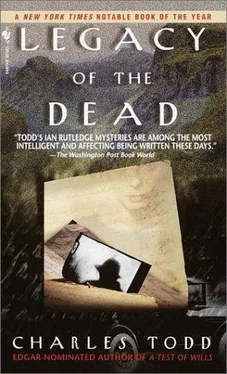Charles Todd - Legacy of the Dead
Здесь есть возможность читать онлайн «Charles Todd - Legacy of the Dead» весь текст электронной книги совершенно бесплатно (целиком полную версию без сокращений). В некоторых случаях можно слушать аудио, скачать через торрент в формате fb2 и присутствует краткое содержание. Жанр: Полицейский детектив, на английском языке. Описание произведения, (предисловие) а так же отзывы посетителей доступны на портале библиотеки ЛибКат.
- Название:Legacy of the Dead
- Автор:
- Жанр:
- Год:неизвестен
- ISBN:нет данных
- Рейтинг книги:5 / 5. Голосов: 1
-
Избранное:Добавить в избранное
- Отзывы:
-
Ваша оценка:
- 100
- 1
- 2
- 3
- 4
- 5
Legacy of the Dead: краткое содержание, описание и аннотация
Предлагаем к чтению аннотацию, описание, краткое содержание или предисловие (зависит от того, что написал сам автор книги «Legacy of the Dead»). Если вы не нашли необходимую информацию о книге — напишите в комментариях, мы постараемся отыскать её.
Legacy of the Dead — читать онлайн бесплатно полную книгу (весь текст) целиком
Ниже представлен текст книги, разбитый по страницам. Система сохранения места последней прочитанной страницы, позволяет с удобством читать онлайн бесплатно книгу «Legacy of the Dead», без необходимости каждый раз заново искать на чём Вы остановились. Поставьте закладку, и сможете в любой момент перейти на страницу, на которой закончили чтение.
Интервал:
Закладка:
Stay where you are -
Was Bowles sending him back to the Gray house because there were new developments in the Scottish investigation and he’d been chosen to handle it at this end? Or had something else come up? But if that was true, Bowles would have left full instructions, telling him where to report and what his duties would be.
It was also possible that Bowles was being perverse, making the assumption that Rutledge would fail in his attempt to reach Lady Maude, and ordering him not to retreat until he’d succeeded. He’d brought only a small case with him; he’d need more shirts, shoes, and another suit if he was ordered to stay beyond two or three days.
Hamish said, “For all you know, he’s sacked you and is letting you dangle in uncertainty until he tells you himself-” Rutledge shut out the cutting voice.
And meanwhile?
He was free to spend the next two days in Lincoln or York. Before the war, he’d have leapt at the chance, having friends he could call on, houses where he knew he was welcome. But two of those friends were dead now, and a third was blind, in hospital, struggling to learn a new profession while his wife waited for him to come home. Still, there were hotels where he could stay At loose ends, alone and with only his thoughts and Hamish as company? It wasn’t a prospect Rutledge relished. He found himself preferring to be called back to London immediately, with another investigation to be handled, keeping him busy, keeping him from remembering that he had ever had a past beyond the last week or even the day before today.
Two days…
Guilt stirred again. He owed his godfather a visit. Or an explanation. He was going to find it hard to do either.
Hamish said, “Why does he no’ come to London?”
David Trevor had turned the London architectural firm over to his partner in the last year of the war. His son’s death had taken the heart out of him, and he had retired to Scotland to heal. He was, according to Frances, writing a book on the history of British architectural style, but it might be no more than an excuse to bury himself in the past until he could face a bleak future.
“For him Scotland offers sanctuary.” But not for me.
Hamish made no reply.
After a moment, Rutledge picked up the receiver again and put in a call to David Trevor. His intent was to make his excuses, to satisfy his conscience. To explain that the press of business made a journey to Scotland in the foreseeable future unlikely. To put off what he could not face yet.
Surely David would be willing to meet him in Durham or somewhere else for the weekend! A compromise to suit them both-on ground that held no memories for either of them.
As Rutledge waited, Hamish said, “He willna’ come-”
“He will. For my sake.”
But twenty minutes later, Rutledge was driving north once more. This time toward the Border. Something in his godfather’s voice, a relief at hearing from him, a need that wasn’t spoken-a surge of warmth when he thought Rutledge had called to give his time of arrival-had made it nearly impossible to refuse or suggest any alternative. It had been taken for granted. As if nothing had changed.
Better to return to the rain of London and the empty flat-better to go to York or Lincoln or Carlisle rather than Scotland, where voices at every turn would remind him of Scots he’d commanded. Men he felt he’d betrayed…
There was hardly a town of any size in the Highlands that he didn’t know by name, because one or a dozen of the men under his command had lived there.
How many lies had he told frightened boys facing battle for the first time? How many lies had he written to grieving women who had just lost a son or a husband? And yet his men had trusted him. He’d listened to them talk about families, crofts, the land, small victories won in short lives- lonely men leaning against the wall of a trench in the dark watches, wanting to remember home, or lying on a stretcher, trying to die bravely. The Scots had made good soldiers and they’d died hard. Not in their tens or hundreds, but in their thousands. Rutledge felt a duty to them still, and it was a burden he hadn’t healed sufficiently yet to put down. It wasn’t easily explained-but it was there, that sense of duty to the dead.
He was going to Scotland now, there was no turning back It’s not as if I’ll be driving as far as Edinburgh, he argued with himself. The Lodge is in the country, for God’s sake! Once there, I could be anywhere-in any part of Britain. It will have to be done sometime. I can’t hide from the past-somehow I must do this It would be arrant cruelty to call again and say I’ve changed my mind But in the deep recesses of his mind, he could feel Hamish refusing to accept any justification Rutledge might offer. For Rutledge this was a hurdle of the spirit. For Hamish it had been the unacceptable horror of dying in France-his permanent exile from the Highlands. He had not come home then. He would not come home now.
The strain of traveling with that stiff, solid wall of refusal began to take its toll.
Approaching Newcastle, on a whim Rutledge took a side turning and drove west for a time, toward Hexham. When he stopped the motorcar in the middle of nowhere, he got out and walked nearly a mile to where the Great Wall that Hadrian had built across the top of England so many centuries before snaked still across the green land. A rampart of earth and stone to keep the Scottish barbarians at bay, supported in its day by forts and garrisons, shops and sentry posts, long since crumbled and covered by time. He had come here as a boy, and the memory of it had stayed with him.
Soldiers had lived and fought and died here, but that was not the odd pull of this place. It was the rolling green land, the high bowl of sky-the vast stillness.
There had been no peace in France. Men standing cheek by jowl in the trenches had had no privacy. The guns, even when silent, could be heard in the bones, that ache of thunder that dulled the brain and deafened the ears for hours afterward. The aeroplanes passing overhead, horses struggling through the mire, the lorries moving up, voices swearing and singing and talking day and night. Or screaming and cursing in pain after an attack, and the barking of dogs searching for the living among the dead.
There had been no stillness in himself either, with Hamish rampant in his mind. He was never truly alone.
But here it was palpable-the quiet He stood there, looking up at the empty blue sky, his head tilted back, his arms out from his sides, his fists unwittingly clenched. And drank in the stillness.
Even the wind had dropped off. Hamish, for a mercy, was silent. And there was no birdsong; the birds had turned south to winter in another climate. The beating of his heart seemed muffled beneath his coat.
Stillness.
It seemed to spread through him, it seemed to wrap him about, it seemed to fill him full.
For nearly a quarter of an hour he stood there alone and listening.
When he turned away to walk back to the car, there were tears in his eyes.
But he had found the strength he needed.
6
Morag Gilchrist greeted Rutledge at the heavy front door of The Lodge almost before he’d knocked.
She had looked after this house just south of Edinburgh for nearly three generations of the Trevor family, and nobody seemed to know just how old she was. If anyone asked, he was given short shrift. Morag’s back was straight as a sergeant-major’s, her eyes as bright as a crow’s, and her hands as soft and steady as a girl’s.
“Mr. Ian!”
He thought for an instant she was going to embrace him. There was such warmth in her face that it seemed to reach out to him. He put his arms around her instead, and she let him, then pushed him away with a “Pshaw! You’ll muss my gown, lad! Give o’wer!”
Читать дальшеИнтервал:
Закладка:
Похожие книги на «Legacy of the Dead»
Представляем Вашему вниманию похожие книги на «Legacy of the Dead» списком для выбора. Мы отобрали схожую по названию и смыслу литературу в надежде предоставить читателям больше вариантов отыскать новые, интересные, ещё непрочитанные произведения.
Обсуждение, отзывы о книге «Legacy of the Dead» и просто собственные мнения читателей. Оставьте ваши комментарии, напишите, что Вы думаете о произведении, его смысле или главных героях. Укажите что конкретно понравилось, а что нет, и почему Вы так считаете.












